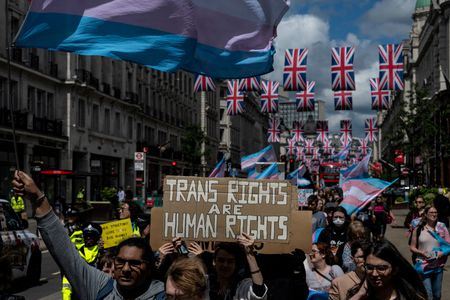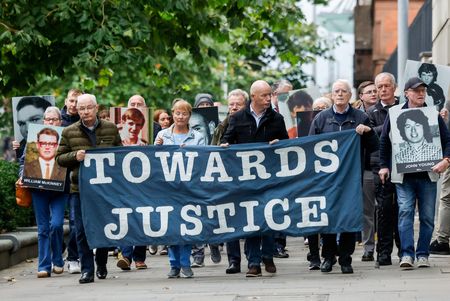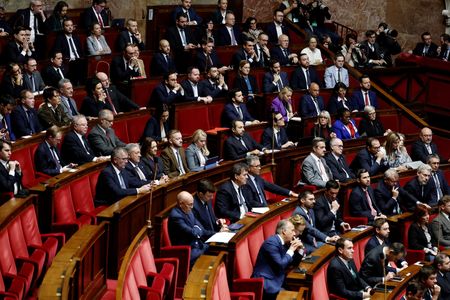By Catarina Demony
LONDON (Reuters) -Britain’s equalities watchdog urged the government to swiftly approve new guidance on transgender rights, six weeks after submitting fresh guidelines based on a court ruling that drew global attention by setting out a legal definition of a wonan.
In April, the Supreme Court affirmed that under equality laws the term “sex” means biological sex — meaning a transgender woman is legally considered male, and a transgender man is considered female.
The decision left institutions, from hospitals to businesses, waiting for official direction on how to apply the ruling in practice when deciding legal protections and access to single-sex spaces.
The Equality and Human Rights Commission, which enforces equality laws, responded to the court ruling with interim guidance stating, for example, that transgender women should not be allowed to use female-only spaces such as toilets, hospital wards, or refuges.
It submitted its revised code to the government in early September, but it has yet to be approved.
In a letter to the minister for women and equalities, Bridget Phillipson, the EHRC warned that the previous 2011 code was now unlawful and would remain so until the minister formally withdraws it.
“How quickly this happens is now in the government’s hands. We urge them to act at speed,” EHRC chair Kishwer Falkner said.
Following ministerial approval, the government must lay the updated code of practice before parliament for 40 days before it can become statutory guidance. A government spokesperson said it was reviewing the proposed code of practice: “It is important that the correct process is followed”.
Transgender rights groups have criticised the EHRC’s interpretation of the ruling, describing it as unnecessarily “extreme” and “harmful”, and transgender people have told Reuters they have been left feeling unsafe in certain spaces.
In a letter on Tuesday, Michael O’Flaherty, the Council of Europe’s commissioner for human rights, warned that the ruling could result in the widespread exclusion of transgender people from public spaces.
Transgender rights have become a highly political issue in Britain and other parts of the world. Some critics say the conservative right has used identity politics to attack minority groups, while others argue that liberal support for transgender people has infringed on the rights of biological women.
(Reporting by Catarina Demony; Editing by William Maclean)











